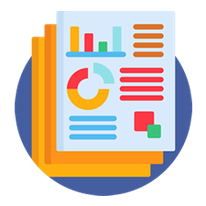Key Features:
No. of pages: 154
Abstract:
The purpose of the study was to determine the extent to which reading difficulties affect the academic performance of Uyo City Polytechnic students. The study objective was to establish comprehension errors that affect students‟ academic performance. Piaget's (1983) theory of cognitive development guided this study. This study employed quantitative approaches for data collection and analyzes both lecturers and learners. The research design was a descriptive survey design.
Data were collected by the use of questionnaires for lecturers of English and student‟. The sample of the study included 10 lecturers and 100 students at Uyo City Polytechnic. Findings from the reading test indicated that students who had fewer problems with word substitution, omission, mispronunciation, and addition scored highly (B+ - C+) at the end of the semester on the exam, and a significant relationship (p>0.05) between these and academic performance was established. Cloze test performance where 5 percent of the students performed below average and students end of semester one exam where all the sampled have less than a mean grade of 5 were indicators of poor academic performance as a result of reading difficulties. Lecturers indicated that there are dropouts (40%), repeaters (20%), and absentees (40%). It was established that ninety percent of the lecturers experienced problems in teaching reading.
Sixty percent of the lecturers did not conduct library lessons at all due to a lack of library resources. Students ignoring or misinterpreting punctuations while reading was another common problem experienced by the majority of the lecturers. The study recommends that lecturers should be in-serviced regularly and that the school administration should ensure the availability of library resources and reference materials through the Ministry of Education. The government and school administration should come up with measures whereby chronic absenteeism as a result of lack of school fees in public mixed-day secondary schools is minimized.
Table of Content:
Declaration
....................................................................................................
Ii
Dedication
....................................................................................................
Iii
Acknowledgements
...................................................................................
Iv
Abstract
......................................................................................................
Xii
Chapter
one: introduction ................. .........................................
1
1.1 Background to the Study
........................................................................ 1
1.2 Statement of the Problem
...................................................................... 5
1.3
Purpose of the Study ..........................................................................
7
1.4 Objectives of the study..........................................................................
7
1.5 Research Questions
...............................................................................
7
1.6 Significance of the Study
....................................................................... 8
1.7 Limitation and Delimitation
.................................................................. 8
1.7.1
Limitation ...........................................................................................
8
1.7.2
Delimitation
.......................................................................................
9
1.8 Assumptions of the Study
...................................................................... 9
1.9 Operational Definition of Terms
......................................................... 14
CHAPTER TWO: REVIEW OF RELATED LITERATURE
2.1
Introduction ........................................................................................
17
2.2 Definitions of Reading and Reading
Difficulties ................................. 17
2.3 Comprehension Errors and Students
Academic Performance ............. 19
2.4 Reading Difficulties on Students
Academic Performance .................... 21
2.4.1 Gender Difference in Reading
Difficulties ...................................... 21
2.4.2 Reading Difficulties and Learning
Disabilities Controversy ........... 21
2.5 Challenges of Dealing with Students with
Reading Difficulties ........... 22
2.6 Strategies to Enhance Reading
Comprehension ................................... 23
2.7 Theoretical Framework
......................................................................... 10
2.7.1 Conceptual Framework on Students‟
Reading Difficulties, Social and Emotional Adjustment
....................................................................... 11
2.7.2 Summary
...........................................................................................
24
CHAPTER THREE: RESEARCH METHODOLOGY
3.1 Introduction
..........................................................................................
26
3.2 Research Design
....................................................................................
26
3.3 Study Variables
.....................................................................................
26
3.3.1 Independent Variable
....................................................................... 26
3.3.2 Intervening Variables
....................................................................... 27
3.3.3 Dependent Variable
......................................................................... 27
3.4 Location of the Study
............................................................................ 27
3.5 Target Population
.................................................................................
28
3.6 Sampling Technique and Sample Size
.................................................. 28
3.6.1 Sampling Technique
........................................................................ 28
3.6.2 Sample Size
......................................................................................
29
3.7 Research Instruments ............................................................................
30
3.7.1
Questionnaires..................................................................................
30
3.7.2 Cloze Test for Students
.................................................................... 30
3.8 Pilot Study
.............................................................................................
31
3.8.1 Validity of the Instruments
.............................................................. 31
3.8.2 Reliability of the
Instruments........................................................... 32
3.9 Data Collection Procedure
.................................................................... 32
3.10 Data Analysis Techniques
................................................................... 33
3.11 Logistical and Ethical Considerations
................................................. 33
3.12 Summary
.............................................................................................
34
CHAPTER FOUR: DATA PRESENTATIONS, ANALYSIS
AND DISCUSSION OF FINDINGS
4.1 Introduction
...........................................................................................
35
4.2 Respondents‟ Demographic Information
.............................................. 35
4.2.1 Gender of Teachers
.......................................................................... 35
4.2.2 Age of Teachers
...............................................................................
36
4.2.3 Education Level of Teachers
........................................................... 37
4.2.4 Teachers‟ years of Service in Current
Schools ................................ 38
4.2.5 Form Three Class Enrollment
.......................................................... 39
4.3 Comprehension Errors that affect
Students‟ Academic Performance. ....... 40
4.3.1 Common Comprehension Errors as Per
Learners‟ Data .................. 40
4.4 Effects of Reading Difficulties
(Comprehension Errors) on Academic Performance ...............................................................................................
41
4.4.1 General Students Performance in
English ....................................... 48
4.4.1.2 Teachers‟ Opinions on Causes of Poor
Academic Performance .... 50
4.4.1.2 Effects of Poor Academic Performance
on Students‟ Learning Consistent
.........................................................................................50
4.5 Challenges Faced by Secondary School
English Language Teachers .. 54
4.5.1 Form Three Students Who Lack Interest
in All School Activities .. 56
4.5.2 Problems in Teaching Reading
Comprehension ............................. 58
4.5.3 Methods that Teachers Use to Assess
Students Reading Comprehension ................................................................................
60
4.5.5 Frequency of Conducting Library
Lessons by Teachers ................. 61
4.6 Strategies that Enhance Reading
Comprehension in Kiambu District Mixed Day Public Secondary Schools
....................................................... 63
4.6.1 Teachers‟ Attendance of In-Service
Training in Reading Instructions After Completion of Their Initial Teachers
Training ...................... 64
4.6.2 Teachers‟ Agreement with Various
Statements on Strategies to Enhance Reading Comprehension
................................................... 65
4.7 Summary
.............................................................................................
67
CHAPTER FIVE: SUMMARY, CONCLUSION AND
RECOMMENDATION
5.1 Introduction
..........................................................................................
68
5.2 Summary
...............................................................................................
68
5.2.1 Demographic Information of Respondents
...................................... 68
5.2.2 Effects of Comprehension Errors on
Students‟ Academic Performance
.....................................................................................
69
5.2.3 Effects of reading Difficulties on
Students‟ Academic Performance.
....................................................................................
70
5.2.4 Challenges Faced by Secondary School
English Language Teachers in Dealing with Reading Difficulties.
.............................................. 70
5.2.5 Strategies for Enhancing Reading
Comprehension ......................... 71
5.3 Conclusions
....................................................................................
72
5.4 Recommendations ..........................................................................
72
5.4.1 Recommendation to the Schools
...................................................... 72
5.4.2 Recommendations to the Government
through the Ministry of Education and Other Stakeholders ...................................................
73
5.4.3 Recommendations for Further Research
.......................................... 73
REFERENCES
APPENDICES
........................................................................................
82
Appendix A: Teachers Questionnaire
................................................. 82
Appendix B: Cloze Procedure Test for Form
Three .............................. 88
Buy Now
